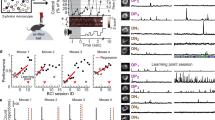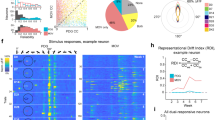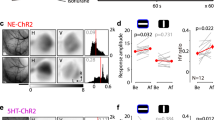Abstract
The brain has a remarkable capacity to adapt to alterations in its sensory environment, which is normally much more pronounced in juvenile animals. Here we show that in adult mice, the ability to adapt to changes can be improved profoundly if the mouse has already experienced a similar change in its sensory environment earlier in life. Using the standard model for sensory plasticity in mouse visual cortex—ocular dominance (OD) plasticity—we found that a transient shift in OD, induced by monocular deprivation (MD) earlier in life, renders the adult visual cortex highly susceptible to subsequent MD many weeks later. Irrespective of whether the first MD was experienced during the critical period (around postnatal day 28) or in adulthood, OD shifts induced by a second MD were faster, more persistent and specific to repeated deprivation of the same eye. The capacity for plasticity in the mammalian cortex can therefore be conditioned by past experience.
This is a preview of subscription content, access via your institution
Access options
Subscribe to this journal
Receive 12 print issues and online access
$209.00 per year
only $17.42 per issue
Buy this article
- Purchase on Springer Link
- Instant access to full article PDF
Prices may be subject to local taxes which are calculated during checkout





Similar content being viewed by others
References
Knudsen, E.I. Instructed learning in the auditory localization pathway of the barn owl. Nature 417, 322–328 (2002).
McGonigle, B.O. & Flook, J. Long-term retention of single and multistate prismatic adaptation by humans. Nature 272, 364–366 (1978).
Krakauer, J.W., Ghez, C. & Ghilardi, M.F. Adaptation to visuomotor transformations: consolidation, interference, and forgetting. J. Neurosci. 25, 473–478 (2005).
Kuhl, P.K. Early language acquisition: cracking the speech code. Nat. Rev. Neurosci. 5, 831–843 (2004).
Knudsen, E.I. Capacity for plasticity in the adult owl auditory system expanded by juvenile experience. Science 279, 1531–1533 (1998).
DeBello, W.M., Feldman, D.E. & Knudsen, E.I. Adaptive axonal remodeling in the midbrain auditory space map. J. Neurosci. 21, 3161–3174 (2001).
Linkenhoker, B.A., der Ohe, C.G. & Knudsen, E.I. Anatomical traces of juvenile learning in the auditory system of adult barn owls. Nat. Neurosci. 8, 93–98 (2005).
Wiesel, T.N. & Hubel, D.H. Single cell responses in striate cortex of kittens deprived of vision in one eye. J. Neurophysiol. 26, 1003–1017 (1963).
Muir, D.W. & Mitchell, D.E. Visual resolution and experience: acuity deficits in cats following early selective visual deprivation. Science 180, 420–422 (1973).
Shatz, C.J. & Stryker, M.P. Ocular dominance in layer IV of the cat's visual cortex and the effects of monocular deprivation. J. Physiol. (Lond.) 281, 267–283 (1978).
Mitchell, D.E., Cynader, M. & Movshon, J.A. Recovery from the effects of monocular deprivation in kittens. J. Comp. Neurol. 176, 53–63 (1977).
Kind, P.C. et al. Correlated binocular activity guides recovery from monocular deprivation. Nature 416, 430–433 (2002).
Liao, D.S., Krahe, T.E., Prusky, G.T., Medina, A.E. & Ramoa, A.S. Recovery of cortical binocularity and orientation selectivity after the critical period for ocular dominance plasticity. J. Neurophysiol. 92, 2113–2121 (2004).
Dräger, U.C. Observations on monocular deprivation in mice. J. Neurophysiol. 41, 28–42 (1978).
Gordon, J.A. & Stryker, M.P. Experience-dependent plasticity of binocular responses in the primary visual cortex of the mouse. J. Neurosci. 16, 3274–3286 (1996).
Grinvald, A., Lieke, E., Frostig, R.D., Gilbert, C.D. & Wiesel, T.N. Functional architecture of cortex revealed by optical imaging of intrinsic signals. Nature 324, 361–364 (1986).
Schuett, S., Bonhoeffer, T. & Hübener, M. Mapping retinotopic structure in mouse visual cortex with optical imaging. J. Neurosci. 22, 6549–6559 (2002).
Kalatsky, V.A. & Stryker, M.P. New paradigm for optical imaging: temporally encoded maps of intrinsic signal. Neuron 38, 529–545 (2003).
Frenkel, M.Y. & Bear, M.F. How monocular deprivation shifts ocular dominance in visual cortex of young mice. Neuron 44, 917–923 (2004).
Sawtell, N.B. et al. NMDA receptor-dependent ocular dominance plasticity in adult visual cortex. Neuron 38, 977–985 (2003).
Pham, T.A. et al. A semi-persistent adult ocular dominance plasticity in visual cortex is stabilized by activated CREB. Learn. Mem. 11, 738–747 (2004).
Tagawa, Y., Kanold, P.O., Majdan, M. & Shatz, C.J. Multiple periods of functional ocular dominance plasticity in mouse visual cortex. Nat. Neurosci. 8, 380–388 (2005).
Fagiolini, M. & Hensch, T.K. Inhibitory threshold for critical-period activation in primary visual cortex. Nature 404, 183–186 (2000).
Yang, Y. et al. Reversible blockade of experience-dependent plasticity by calcineurin in mouse visual cortex. Nat. Neurosci. 8, 791–796 (2005).
Cynader, M. & Mitchell, D.E. Prolonged sensitivity to monocular deprivation in dark-reared cats. J. Neurophysiol. 43, 1026–1040 (1980).
Pizzorusso, T. et al. Reactivation of ocular dominance plasticity in the adult visual cortex. Science 298, 1248–1251 (2002).
Antonini, A., Fagiolini, M. & Stryker, M.P. Anatomical correlates of functional plasticity in mouse visual cortex. J. Neurosci. 19, 4388–4406 (1999).
Mataga, N., Mizuguchi, Y. & Hensch, T.K. Experience-dependent pruning of dendritic spines in visual cortex by tissue plasminogen activator. Neuron 44, 1031–1041 (2004).
Oray, S., Majewska, A. & Sur, M. Dendritic spine dynamics are regulated by monocular deprivation and extracellular matrix degradation. Neuron 44, 1021–1030 (2004).
Hensch, T.K. Critical period regulation. Annu. Rev. Neurosci. 27, 549–579 (2004).
Hübener, M. Mouse visual cortex. Curr. Opin. Neurobiol. 13, 413–420 (2003).
Prusky, G.T. & Douglas, R.M. Developmental plasticity of mouse visual acuity. Eur. J. Neurosci. 17, 167–173 (2003).
Acknowledgements
We thank A. King for comments on the manuscript and M. Sperling for computing help. This work was supported by the Max Planck Society (S.B.H., T.D.M.-F., T.B. and M.H.) and the Alexander von Humboldt Foundation (T.D.M.-F.).
Author information
Authors and Affiliations
Corresponding author
Ethics declarations
Competing interests
The authors declare no competing financial interests.
Rights and permissions
About this article
Cite this article
Hofer, S., Mrsic-Flogel, T., Bonhoeffer, T. et al. Prior experience enhances plasticity in adult visual cortex. Nat Neurosci 9, 127–132 (2006). https://doi.org/10.1038/nn1610
Received:
Accepted:
Published:
Issue Date:
DOI: https://doi.org/10.1038/nn1610
This article is cited by
-
Optimizing intact skull intrinsic signal imaging for subsequent targeted electrophysiology across mouse visual cortex
Scientific Reports (2022)
-
Lateral geniculate neurons projecting to primary visual cortex show ocular dominance plasticity in adult mice
Nature Neuroscience (2017)
-
Monocular deprivation induces dendritic spine elimination in the developing mouse visual cortex
Scientific Reports (2017)
-
What is memory? The present state of the engram
BMC Biology (2016)
-
Nogo-A deletion increases the plasticity of the optokinetic response and changes retinal projection organization in the adult mouse visual system
Brain Structure and Function (2016)



